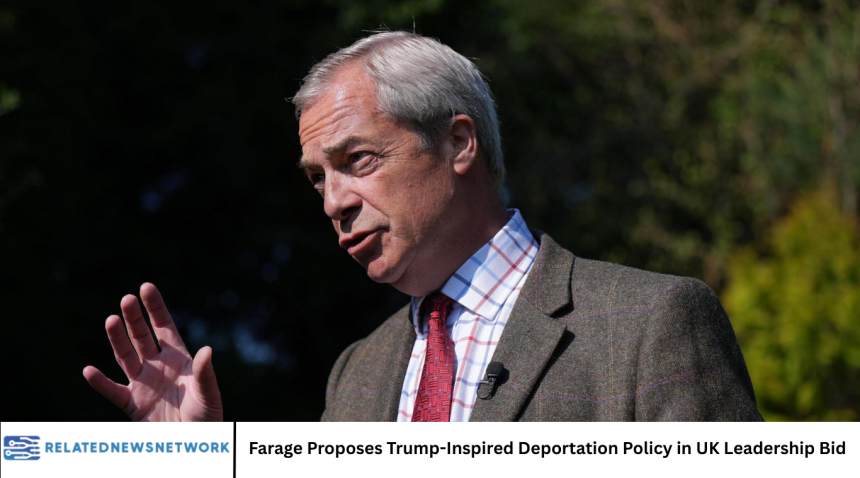Nigel Farage, a prominent British political figure known for his role in Brexit and his outspoken views on immigration, has recently unveiled a controversial proposal reminiscent of former U.S. President Donald Trump’s hardline immigration policies. As Farage positions himself for a potential leadership role in the UK, his call for a Trump-style deportation initiative has reignited debates on immigration, national security, and Britain’s future direction post-Brexit.
This article delves into the background of Farage’s policy proposal, its political implications, public and expert reactions, and the broader context of immigration in the UK. It further analyzes the challenges and controversies surrounding such policies and explores what this means for the UK’s political landscape.
Background: Nigel Farage’s Political Profile and Brexit Legacy
Nigel Farage has been a polarizing figure in British politics for decades. Known primarily for spearheading the campaign to leave the European Union, Farage has consistently championed stricter immigration controls and a reassertion of British sovereignty. His political style is characterized by blunt rhetoric, populist appeals, and a willingness to challenge establishment norms.
Following the UK’s official departure from the EU, immigration policy became a focal point in the national discourse. Farage’s leadership bid comes at a time when many voters remain divided on how Britain should manage its borders and balance economic needs with national security concerns.
The Trump-Style Deportation Proposal Explained
Farage’s recent announcement outlines a vision for the UK’s immigration policy that draws clear inspiration from the Trump administration’s approach in the United States. Central to this proposal is:
- Mass Deportation Initiatives: Targeting undocumented immigrants and those considered threats to public safety.
- Increased Border Enforcement: Expanding the UK’s border security infrastructure and employing stricter border checks.
- Tougher Immigration Laws: Introducing new legislation aimed at reducing net migration significantly.
- Prioritization of Deportation Efforts: Focusing resources on removing non-citizens with criminal records or who have violated immigration laws.
Farage argues this policy is essential to restore law and order, protect British jobs, and uphold national sovereignty.
Political Context: Why Now?
Farage’s timing coincides with growing concerns among sections of the UK electorate about immigration’s social and economic impacts. After Brexit, the UK has regained control over its borders, but the debate over how strictly to control immigration continues to dominate political conversations.
In a leadership contest, Farage’s hardline stance seeks to appeal to voters who feel disenfranchised or frustrated by what they see as lenient immigration policies by mainstream parties. It also serves as a challenge to Conservative and Labour politicians, signaling a shift toward more populist and nationalist rhetoric.
Public Reaction: Divided Opinions
The reaction to Farage’s deportation plan has been sharply divided:
- Supporters praise the proposal as a necessary measure to safeguard British identity, reduce crime, and protect jobs. Many cite concerns about the impact of immigration on public services and housing.
- Critics argue the policy is excessively harsh, potentially undermines human rights, and risks damaging the UK’s international reputation. Concerns are also raised about the social cohesion and economic consequences of aggressive deportation.
- Immigration Advocates highlight the risks of targeting vulnerable communities, emphasizing that many undocumented immigrants contribute positively to society and economy.
Comparisons with Trump’s Immigration Policies
The Trump administration’s immigration policies were defined by a zero-tolerance approach, family separations, travel bans, and aggressive border control measures. Farage’s proposal reflects many of these elements but adapted for the UK context.
Differences include:
- The UK’s legal and political framework is distinct, with different human rights protections and immigration laws.
- The UK’s immigration challenges relate heavily to EU nationals, post-Brexit arrangements, and asylum seekers.
The similarities, however, lie in the rhetoric and the populist appeal to nationalist sentiments.
Economic and Social Implications
A mass deportation policy would have significant economic and social effects:
- Labor Market: The UK economy relies on immigrant labor in sectors like healthcare, agriculture, hospitality, and construction. Large-scale deportations could lead to labor shortages.
- Public Services: While some argue that reducing immigration eases pressure on services, others warn that sudden removals could disrupt communities and create social unrest.
- Human Rights Concerns: Deportations risk separating families, affecting asylum seekers, and violating international protections.
Understanding these implications is essential to evaluating the policy’s feasibility and sustainability.
Legal and Ethical Challenges
Implementing a Trump-style deportation policy would face numerous legal and ethical hurdles in the UK:
- Human Rights Law: The UK is bound by international treaties and domestic laws protecting the rights of migrants and refugees.
- Judicial Oversight: Courts may intervene if deportations violate due process.
- Public Backlash: Ethical concerns about mass deportations can spark protests and damage social cohesion.
Farage’s proposal would require legislative changes and strong government backing to overcome these challenges.
Political Impact: Influence on UK Leadership Race
Farage’s proposal may shape the UK leadership race in several ways:
- For Farage: It solidifies his position as a champion of hardline immigration controls and appeals to nationalist voters.
- For Other Candidates: It pressures rivals to clarify or toughen their immigration stances.
- On Party Dynamics: It could deepen divides within parties between moderates and populists.
How voters respond to Farage’s proposal will likely influence the direction of UK politics on immigration for years to come.
International Reactions
The international community watches the UK’s immigration debates closely:
- European Neighbors: Concerned about refugee flows, border control, and human rights standards.
- Human Rights Organizations: Monitoring for potential violations and abuses.
- Global Investors: Assessing how immigration policy impacts economic stability.
Farage’s proposal risks complicating diplomatic relationships if perceived as too harsh.
Future of UK Immigration Policy
Farage’s proposal is part of a broader conversation about the UK’s post-Brexit identity. Policymakers must balance:
- National security and sovereignty
- Economic growth and labor needs
- Social integration and human rights
The path forward requires nuanced debate and careful policymaking.
Frequently Asked Questions
What exactly is Nigel Farage proposing regarding deportations?
Farage is advocating for a mass deportation strategy targeting undocumented immigrants and those who breach immigration laws, alongside tougher border enforcement and stricter immigration legislation.
How similar is Farage’s plan to Donald Trump’s immigration policies?
The plan mirrors Trump’s zero-tolerance, hardline immigration stance, emphasizing deportations and border security, but tailored to the UK’s legal and social context.
What are the potential economic consequences of such a deportation policy?
Mass deportations could lead to labor shortages in key sectors, disrupt local economies, and strain public services if large communities are affected.
Are there legal barriers to implementing Farage’s deportation plan?
Yes. UK human rights laws, international treaties, and judicial oversight create significant legal challenges that could delay or block mass deportations.
How has the public reacted to Farage’s proposal?
Public opinion is divided, with supporters viewing it as necessary for national security and opponents warning about human rights and social consequences.
Could this policy affect the UK’s international relations?
Potentially. Aggressive deportation policies might strain diplomatic ties, especially with neighboring EU countries and human rights watchdogs.
What impact could Farage’s proposal have on the UK leadership race?
It may boost Farage’s appeal among nationalist voters while forcing other candidates to clarify or adjust their immigration policies in response.
Conclusion
Nigel Farage’s Trump-inspired deportation policy is a bold and controversial move that reflects deeper tensions within the UK about immigration and national identity. Whether this approach will resonate with voters and shape future government policies remains to be seen. What is clear, however, is that immigration will remain a defining issue in British politics.






